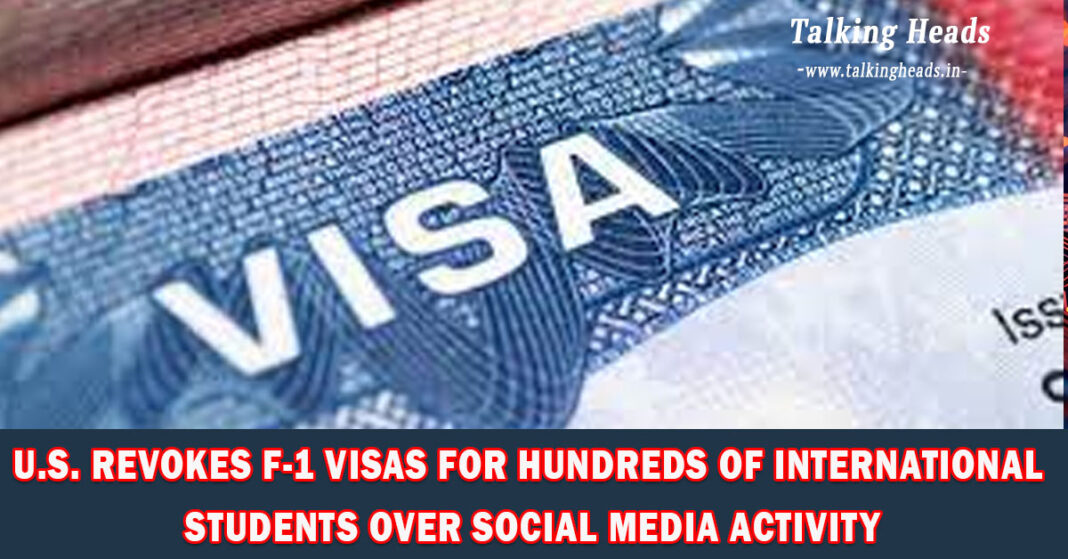In a shocking development, hundreds of international students in the United States have received emails from the U.S. Department of State, notifying them of the revocation of their F-1 visas. The emails also demand that these students undergo self-deportation—a process that requires them to leave the U.S. voluntarily.
This unprecedented move has sparked a heated debate about the balance between national security, freedom of speech, and immigration laws in the United States.
Table of Contents
Why Were F-1 Visas Revoked?

The revocation of F-1 visas is reportedly based on students’ social media activities. According to the U.S. Department of State, students who engaged in “anti-national activities”—including sharing, liking, or commenting on political posts—have been targeted.
This action does not apply only to students who actively participated in protests but also to those who expressed political views online. Many students, without any criminal record, have been caught in this sweeping policy, raising concerns about the fairness and transparency of the process.
What Is a Self-Deportation Order?
Self-deportation refers to the requirement for individuals to leave the country voluntarily after their legal status has been revoked. In this case, affected F-1 visa holders have been instructed to exit the U.S. on their own, avoiding formal deportation proceedings.
The emails sent to the students explicitly warn that failure to comply may result in fines, detention, or forced deportation. Additionally, students are instructed not to use their revoked visas and to submit their passports to the nearest U.S. embassy.
Understanding the F-1 Visa
The F-1 visa is a non-immigrant visa that allows international students to study full-time at accredited U.S. institutions. To qualify, students must enroll in a full-time academic program and demonstrate sufficient financial resources to cover tuition and living expenses.
This visa has been a gateway for millions of students worldwide to pursue higher education in the U.S., but the recent developments have cast a shadow over its reliability.
U.S. Government’s Tough Stance on National Security

U.S. Secretary of State Marco Rubio defended the decision, stating that the U.S. has the authority to decide who enters and stays in the country. The government has introduced an AI-powered tool called “Catch and Revoke,” which monitors students’ social media activity. The system flags individuals suspected of supporting terrorist organizations or engaging in activities deemed anti-national.
Rubio emphasized, “Visas are not a birthright. Those who violate the rules must leave the country.”
The Shocking Email: A Wake-Up Call for Students
The emails sent to affected students cited Section 221(i) of the U.S. Immigration and Nationality Act, under which their F-1 visas were revoked. The message warned that students who remain in the U.S. without valid visas could face legal consequences, including fines, detention, or deportation.
Many students have expressed shock and frustration over the decision, questioning whether posting political memes or engaging in online discussions should result in the loss of their legal status.
Concerns Among International Students and Immigration Advocates
This move has triggered widespread anxiety among international students and immigration advocates. Many fear that this policy could set a dangerous precedent, threatening the freedom of expression and academic freedom that the U.S. has long been known for.
Students have taken to social media to voice their discontent, with some stating that they had no intention of engaging in any form of anti-national activity. They argue that political expression, even online, should not be grounds for visa revocation.
Global Implications of the U.S. Decision
The revocation of F-1 visas based on social media activity could have far-reaching consequences. It may deter international students from pursuing education in the U.S., impacting the country’s global reputation as a hub for academic excellence.
Furthermore, this policy raises questions about the balance between national security and individual rights in a democratic society. As the situation unfolds, many are calling for transparency and accountability from the U.S. government.










